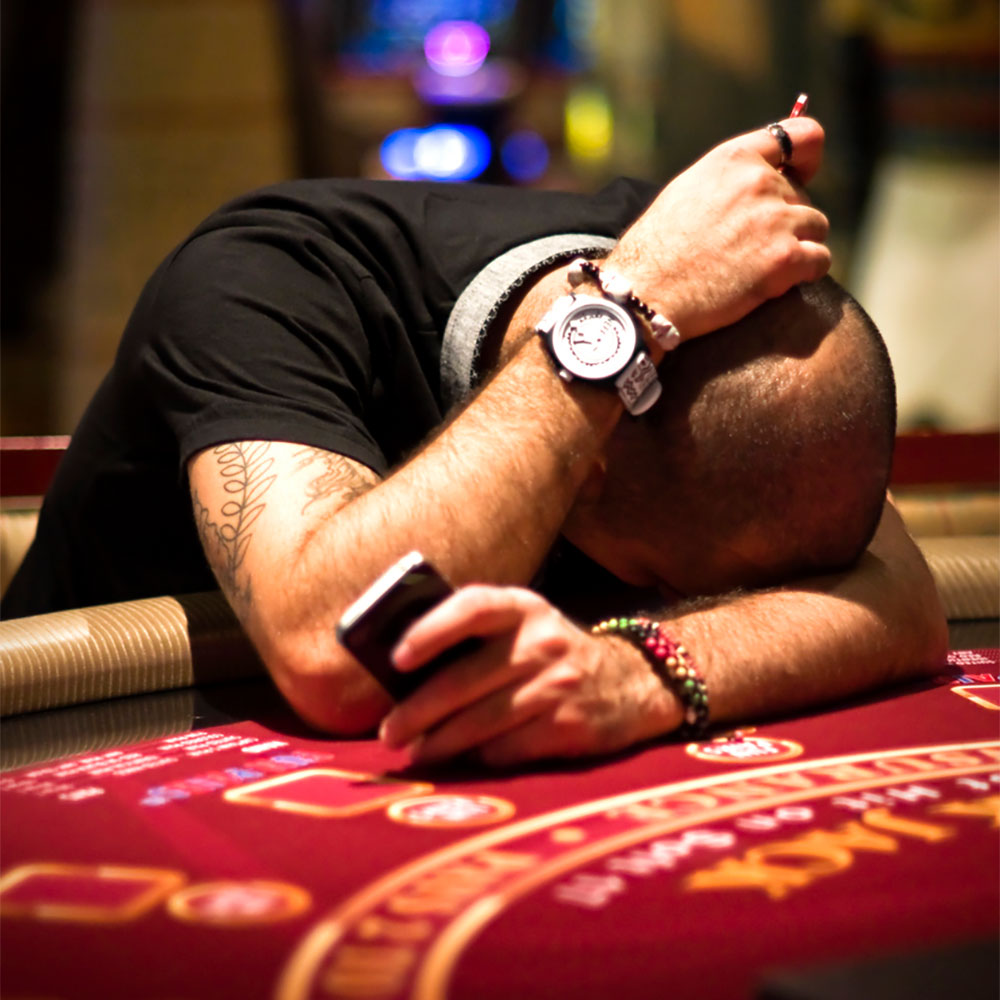Problem Gambling What Factors Contribute?

The treatment for gambling addiction has identified three main factors that contribute to the gambling problem:
-
- The “high” that happens when gambling.
-
- Desperation to win money.
-
- The appeal of a lively, thrilling gambling scene.
While some people are able to gamble occasionally and then stop, a gambling disorder is much more than this. Individuals with a gambling disorder cannot stop thinking about gambling, even if they want to. Instead, they may keep going back in hopes of winning back losses, creating a cycle of wins, losses, and more gambling. So, why is gambling addictive?
Similar to substance use disorders, people with gambling disorders may feel the need to gamble with larger amounts of money to experience the same level of excitement. If they try to quit or cut back, they may experience symptoms like restlessness, irritability, or even depression. Gambling disorder is also often associated with other mental disorders like anxiety, depression, substance use, and personality disorders. That’s why timely treatment for gambling addiction is so important for long-term mental and emotional stability.


East Point Behavioral Health: Treatment for Gambling Addiction in Massachusetts
If you or someone you care about has an issue with problem gambling or sports betting, gambling addiction treatment centers like East Point Behavioral Health can help rebuild your life. To make care more accessible, we also offer online therapy for gambling addiction for those who need flexible treatment options.
This condition is definitely treatable. Our gambling disorder professionals will conduct a full assessment, diagnose the conditions you are experiencing, and put together a personalized treatment plan that meets your needs and goals. There is no one route to recovering from problem gambling; instead, it’s about finding what works for you and your current situation in one of the treatment facilities for gambling addiction.
Some of the most effective treatment options for gambling disorder are:
- Medication management for mental health
- Individual therapy
- Client centered group therapy
- Family therapy
The Symptoms of Gambling Disorder
It’s not always easy to know if you have a gambling problem or are developing one. In fact, less than 10% of people with a gambling disorder actually seek professional treatment for gambling addiction due to factors like shame, denial, fear of stigma, and believing they can handle the problem on their own. Here are some red flags that your gambling may be more than just a fun hobby:
Spending for Excitement
A telltale sign of a gambling disorder is feeling the need to spend money to achieve excitement. Do you continue gambling, despite landing a jackpot? Does it feel good to bet larger sums of money?
Trouble Stopping
If you have tried to stop or cut back on your gambling but were unable to, this is a clear indication that you have some level of problem gambling.
Obsessing Over Gambling
Are you always thinking about gambling? Do you feel restless or irritable if you’re not gambling? This suggests that you may be developing a gambling disorder that is consuming your thoughts.
Significant Financial Losses
Losing a lot of money to gambling should actually deter you from gambling. However, if you have a gambling problem, you’ll feel compelled to continue gambling despite your losses, which can add up significantly over time.
Hiding Gambling From Others
If you’re hiding your gambling from your loved ones or lying about your financial situation, chances are, you are embarrassed about the extent of your gambling. Eventually, this can harm your relationships with others, plus ruin your finances.
Mental Disorders
People often use gambling to escape uncomfortable feelings. If you are compulsively gambling and also struggling with anxiety, depression, or another mental disorder, it’s likely that they are both driving each other.
Do You Qualify for Mental Health Treatment in Massachusetts?
East Point Behavioral Health provides specialized mental health care in Massachusetts for adults aged 18 and older. While we do not specialize in substance use disorders (SUD), we address co-occurring conditions and can connect you with trusted SUD treatment referrals if needed. Our mission is to remove barriers to mental health care by offering immediate intervention and prompt access to treatment. Contact us today to start your journey toward mental wellness!
The Benefits of IOP for Gambling Addiction Treatment in MA
Without treatment, gambling disorders often get worse and cause more problems in a person’s life. How to stop gambling addiction? Getting ahead of the problem gives you the best chance for a full recovery. Here are some benefits of participating in IOP programs in Massachusetts:
Effective, Proven Results
Our gambling disorder professionals know how to deliver effective results. We help individuals overcome underlying anxiety or depression while also teaching them effective coping skills. We tailor all approaches along the way, and we can prescribe medication if necessary. If anything changes, we can update your treatment plan to reflect progress or new challenges.
Structured and Flexible Setting
Outpatient programs are convenient, as they allow you to live at home while receiving specialized care. This way, you can keep up on your responsibilities in your personal or professional life, plus gradually transition to the real world under the care and supervision of our team. Our program also supports a structured routine that prevents too much downtime and promotes regular activity.
Improve Your Support System
People have better outcomes when they have supportive friends and family by their side. East Point Behavioral Health will help you build up your support system. Family therapy strengthens relationships with family members, while group therapy connects you with others who are facing similar challenges. This prevents isolation and gives you an outlet to share your experiences in a non-judgmental environment.


How an IOP Works as a Treatment for Gambling Addiction
How to stop a gambling addiction? When you receive care at East Point Behavioral Health, online or in person, you will receive all of these therapeutic interventions under one roof:
Individual Therapy
Individual therapy helps people develop strategies for coping with gambling urges, managing underlying issues, and building a foundation for long-term recovery. For example, cognitive behavioral therapy in Massachusetts teaches techniques like cognitive restructuring, helping you challenge and change irrational beliefs. Behavioral modification provides healthier alternatives to gambling.
Group Therapy
Group therapy allows individuals with gambling problems to connect with others who face similar struggles. It creates a sense of community, reduces isolation, and provides a safe environment for sharing experiences, learning coping skills, and building accountability. Plus, you can build up your support network by participating in group therapy sessions.
Family Therapy
Like other mental disorders, a gambling addiction doesn’t just affect the individual; it affects the family unit as well. This is why family therapy can be beneficial, as it improves communication, establishes healthy boundaries, and rebuilds relationships. Family therapy also provides a safe space for working through other underlying issues in the family, further reducing the need to seek out unhealthy behaviors like gambling.
Medication Management
Medication may be a helpful addition to your treatment plan, particularly if you are dealing with other mental health problems like anxiety or depression. Mood stabilizers and antidepressants are often used first, though other medications may be added depending on your symptoms and if you have been using substances. Each client is evaluated on a case-by-case basis to determine if medication is necessary.

Access Help Anywhere: Online Therapy for Gambling Addiction
You don’t need to live near our facility to get professional help for gambling addiction. At East Point Behavioral Health, we offer online therapy for gambling addiction so you can receive high-quality care from wherever you are. Whether you’re in Massachusetts or another state entirely, our virtual services are here to support you.
Online therapy makes it easier to stay on track. You’ll work with licensed therapists in private, secure sessions from the comfort of your home. This option is ideal if you have a busy schedule, limited access to transportation, or prefer to receive care in a more familiar environment.
Just like our in-person programs, online therapy focuses on helping you build healthier habits, manage urges, and understand what’s driving your gambling behavior. It’s the same personalized care, just more accessible.
Wherever you are, we’ll meet you there.
Start Your Treatment for Gambling Addiction in Massachusetts
A gambling disorder can take a serious toll, but there’s always a path forward. With the right support, recovery is possible. East Point Behavioral Health in Massachusetts offers personalized treatment for gambling addiction through in-person and online services that focus on the whole individual, not just the symptoms. If you’re looking for answers on how to help someone with a gambling addiction, or you’re seeking help yourself, we’re here to guide you. Reach out to our team today and take the first step toward lasting recovery.
Frequently Asked Questions
How do I know if I need professional treatment for gambling addiction?
If gambling is interfering with your finances, relationships, or emotional health, it’s time to seek treatment for gambling addiction. Early intervention can prevent more serious issues and support lasting recovery.
What makes gambling addiction treatment centers different from general therapy services?
Gambling addiction treatment centers offer specialized care designed to address the complex emotional, behavioral, and financial aspects of gambling problems. This focus leads to more effective recovery outcomes than general therapy services.
Can gambling addiction affect mental health even without major financial losses?
Yes. Even without severe financial consequences, gambling addiction can cause significant emotional distress, anxiety, depression, and strained relationships. Seeking help through treatment facilities for gambling addiction can address these underlying mental health impacts.
What are the early warning signs that I might need help for gambling addiction?
Early signs include hiding gambling from loved ones, gambling with money you can’t afford to lose, or feeling restless when trying to stop. Recognizing these signs early makes treatment for gambling addiction more effective and recovery smoother.
Can online therapy for gambling addiction provide the same support as in-person sessions?
Absolutely! Modern online therapy for gambling addiction offers structured, evidence-based counseling with the same level of professional support as traditional therapy. It also provides additional flexibility and privacy for clients.